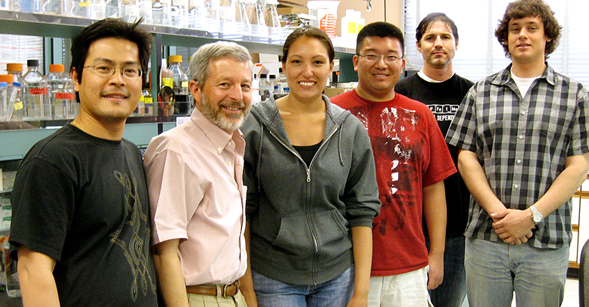A Lineage of Success
Sanford Bernsteins influence in the field of biology reaches far and wide.

This story is featured in the fall 2014 issue of 360:The Magazine of San Diego State University.
For as long as there’s been a molecular biology program at San Diego State University, Sanford Bernstein has been at its center. The soft-spoken fruit fly researcher was recruited to join SDSU in 1983 as an assistant professor of biology, and the university tasked him and colleague Judith Zyskind with helping to build productivity and competitiveness in biological research.
Bernstein remembers the first class he ever taught at SDSU was Recombinant DNA Technology. The class was part of a certificate program that eventually morphed into the modern Certificate in Biotechnology. The program’s description from 1984 notes that “[s]tudents are required to do an internship in a local biotechnology company or in a research laboratory on campus.”
Bernstein recognized then something that many top-tier biology programs are only slowly coming around to today: If you want students to be successful in biology, they need exposure to careers outside academia.
“That’s one place where SDSU has been ahead of the curve,” Bernstein said. “We’ve always promoted going into industry as an acceptable, desirable career path. There’s no stigma attached to not going into academia.”
A long legacy
Looking over the list of master’s students, doctoral students and postdoctoral scholars mentored by Bernstein in his 31 years as an SDSU professor, it’s easy to see that his philosophy has paid off. Several of his postdocs and Ph.D. students rank among the top executives and senior scientists at major biotechnology firms around the country and world.
Bernstein’s very first mentee was a graduate research assistant assigned to him as part of his hiring package. Patrick O’Donnell was a gifted scientist and lab hand, but he wasn’t fascinated enough by the science to devote his career to studying fruit flies.
“One day I got a call from the San Diego police department,” Bernstein said. “They were looking for a scientist to start their new DNA forensics unit. I highly recommended Patrick.”
Today, O’Donnell supervises the DNA unit of the San Diego police department’s crime lab. But Bernstein’s influence didn’t end there. A few months ago, a talented SDSU master’s biology student, Roxanne Kotzebue, asked Bernstein for advice in applying for an open position in the crime lab. He recommended her to O’Donnell, and she was eventually hired as a criminalist working under his supervision.
Rising to the challenge
Bernstein said he didn’t take to the classroom immediately. At first, he saw it as a chore that took time away from his lab work, but over the years he has learned to embrace this side of academic life.
“In the beginning, I had a rather staid academic approach to teaching,” he said. “I hate to say it, but I had the mindset that I did teaching so I could do my research. That changed as I learned to make presentations more engaging, to speak louder, and to use visual aids.”
Today, he has directly mentored nine postdocs, eight doctoral students and 26 master’s students, the great majority of whom have found success in some slice of science. He also co-directs the National Institutes of Health–funded Initiative for Maximizing Student Development program for undergrads from underrepresented backgrounds. It’s a history of achievement few can match, but Bernstein is humble about his role in the successes of his academic progeny.
“In the end, I can’t take all the credit,” Bernstein said. “It’s the lab environment, it’s students’ mentalities and it’s the expectation that SDSU puts on them.”



